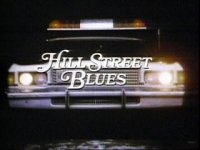List of Hill Street Blues cast members
| Hill Street Blues | |
|---|---|
 |
|
| Genre | |
| Created by |
|
| Starring | See Cast |
| Theme music composer | Mike Post |
| Country of origin | United States |
| Original language(s) | English |
| No. of seasons | 7 |
| No. of episodes | 146 (list of episodes) |
| Production | |
| Location(s) | Republic Studios, Los Angeles, California |
| Running time | 49 minutes |
| Production company(s) | MTM Enterprises |
| Release | |
| Original network | NBC |
| Picture format | Color |
| Original release | January 15, 1981 – May 12, 1987 |
| Chronology | |
| Followed by | Beverly Hills Buntz |
Hill Street Blues is an American serial police drama that aired on NBC in primetime from 1981 to 1987 for a total of 146 episodes. The show chronicled the lives of the staff of a single police station located on the fictional Hill Street, in an unnamed large city, with "blues" being a slang term for police officers for their blue uniforms. The show received critical acclaim, and its production innovations influenced many subsequent dramatic television series produced in the United States and Canada. Its debut season was rewarded with eight Emmy Awards, a debut season record surpassed only by The West Wing. The show received a total of 98 Emmy nominations during its run.
MTM Enterprises developed the series on behalf of NBC, appointing Steven Bochco and Michael Kozoll as series writers. The writers were allowed considerable creative freedom and created a series that brought together a number of emerging ideas in TV drama for the first time. Each episode featured a number of intertwined storylines, some of which were resolved within the episode, with others developing over a number of episodes throughout a season. The conflicts between the work lives and private lives of the individual characters were also large elements of storylines. The series featured a strong focus on the workplace struggle between "what is right" and "what works". Almost every episode began with a pre-credit sequence (or "teaser") consisting of (mission) and roll call at the beginning of the day shift (from season three it experimented with a "Previously on..." montage of clips of up to six previous episodes before the roll call). Many episodes were written to take place over the course of a single day, and often concluded with Capt. Frank Furillo (Daniel J. Travanti) and public defender Joyce Davenport (Veronica Hamel) in a domestic situation, often in bed, discussing how their respective days went. The series was notable for dealing with real-life issues and employing commonly used language and slang to a greater extent than had been seen before, which brought a sense of verisimilitude to the production.
...
Wikipedia
